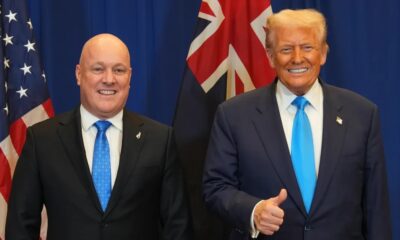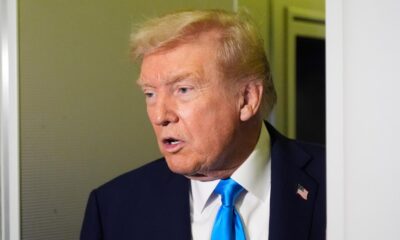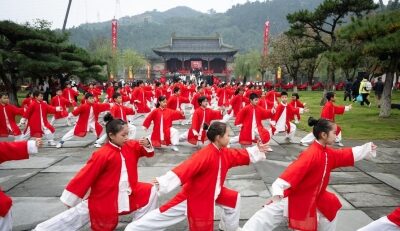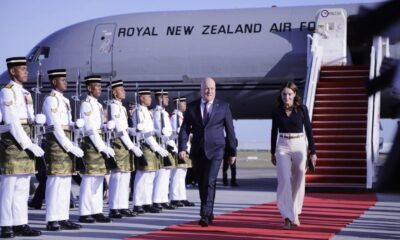Lifestyle
Trump Optimistic Ahead of Key Trade Talks in South Korea
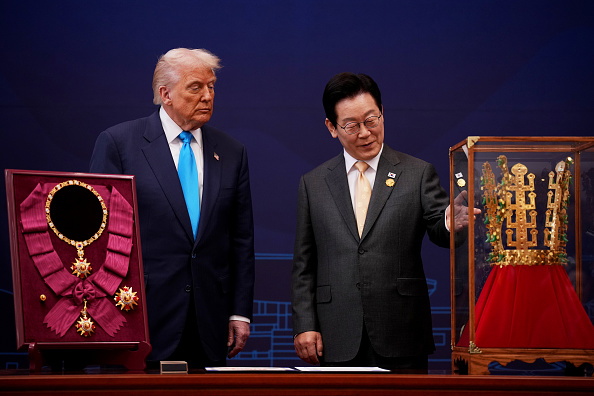
Arriving in South Korea from Tokyo, Donald Trump expressed optimism about upcoming trade discussions with Xi Jinping, the leader of China, following a day marked by geopolitical tension due to North Korea’s recent missile test. The President was greeted warmly by South Korean President Lee Nak-yon in Gyeongju, the host city for this year’s Asia-Pacific Economic Cooperation (APEC) forum.
Trump downplayed the significance of North Korea’s actions, focusing instead on the potential for a positive outcome in his discussions with China. Speaking to reporters aboard Air Force One, he stated, “The relationship with China is very good. So I think we’re going to have a very good outcome for our country and for the world, actually.” He anticipates a reduction of tariffs on Chinese goods in return for China’s commitment to limit exports of fentanyl precursor chemicals, a significant point of contention in U.S.-China trade relations. According to the Wall Street Journal, the U.S. could halve the current 20% tariffs imposed as retaliation.
Trade Challenges with South Korea
Before his meeting with Lee, Trump addressed a summit of APEC CEOs, indicating that a trade deal with South Korea would be finalized “very soon.” Nonetheless, officials from both nations have tempered expectations for a significant breakthrough this week. In late July, South Korea and the U.S. announced an arrangement designed to mitigate the adverse effects of tariffs, with South Korea committing to invest $350 billion into the U.S. economy. However, negotiations regarding the structure of these investments have stalled.
During their meeting at the National Museum of Korea, Trump was awarded the “Grand Order of Mugunghwa,” the highest honor in South Korea. “I’d like to wear it right now,” he humorously remarked. At the same event, President Lee pledged to increase defense spending, addressing Trump’s concerns that allies are not contributing their fair share. He also requested U.S. approval to reprocess nuclear fuel for submarine power, a move currently restricted under an agreement with the United States.
Trump assured Lee of his commitment to assist South Korea with its ongoing challenges regarding North Korea, which remains technically in a state of war since the armistice ending the Korean War in 1953. Although Trump has sought a meeting with North Korean leader Kim Jong Un during this visit, he acknowledged that timing would not align.
Regional Security and Trade Dynamics
Skipping the main APEC summit, Trump plans a dinner with Lee and bilateral meetings with leaders from various countries, including China. U.S. officials reported that negotiators from the two largest economies have established a framework for pausing increased tariffs and export controls on Chinese rare earth minerals, leading to a surge in stock markets.
In discussions with Xi, Trump is expected to address the controversial sales of Nvidia’s cutting-edge Blackwell AI chips to China, a key issue in the ongoing trade negotiations. Since taking office, Trump has adjusted his stance on Taiwan, a region claimed by China. He mentioned that Xi has assured him there would be no invasion of Taiwan during his presidency, yet he has not yet approved new arms sales to Taipei. Taiwan’s Foreign Minister, Lin Chia-lung, expressed confidence that Trump would not abandon the island in his discussions with Xi, despite China’s strong language regarding the use of force.
As Trump’s trip to South Korea concludes a busy tour of the region, he has faced criticism for his tariff policies and the increasing competition with China. In Malaysia, he announced several trade agreements and facilitated an expanded truce between Thailand and Cambodia following a border dispute. His visit to Japan included commendations for the country’s first female Prime Minister, Sanae Takaichi, who committed to enhancing military capabilities while negotiating trade agreements and investments related to rare earth minerals.
Washington is urging South Korea to adopt a similar investment strategy to that of Japan, but Seoul has expressed concerns about the feasibility of meeting its pledged investments upfront. Instead, South Korea is proposing a combination of phased investments, loans, and other measures, which reflects the complexities of contemporary international trade dynamics.
-

 Sports2 months ago
Sports2 months agoNetball New Zealand Stands Down Dame Noeline Taurua for Series
-

 Entertainment2 months ago
Entertainment2 months agoTributes Pour In for Lachlan Rofe, Reality Star, Dead at 47
-

 Entertainment3 weeks ago
Entertainment3 weeks agoNew ‘Maverick’ Chaser Joins Beat the Chasers Season Finale
-

 Sports2 months ago
Sports2 months agoSilver Ferns Legend Laura Langman Criticizes Team’s Attitude
-

 Politics4 weeks ago
Politics4 weeks agoNetball NZ Calls for Respect Amid Dame Taurua’s Standoff
-

 Entertainment2 months ago
Entertainment2 months agoKhloe Kardashian Embraces Innovative Stem Cell Therapy in Mexico
-

 World3 months ago
World3 months agoPolice Arrest Multiple Individuals During Funeral for Zain Taikato-Fox
-

 Sports2 months ago
Sports2 months agoGaël Monfils Set to Defend ASB Classic Title in January 2026
-

 Entertainment1 month ago
Entertainment1 month agoTyson Fury’s Daughter Venezuela Gets Engaged at Birthday Bash
-

 Sports1 month ago
Sports1 month agoHeather McMahan Steps Down as Ryder Cup Host After Controversy
-

 World1 week ago
World1 week agoSevere Winds Hit New Zealand, Over 100 Flights Canceled
-

 Entertainment1 month ago
Entertainment1 month agoTyson Fury’s Daughter Venezuela Gets Engaged at Birthday Bash

